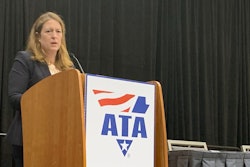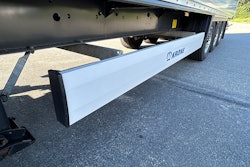The rules governing the classification of independent truckers are like the weather in the Great Plains: wait a bit, and they'll change.
And it's that volatility that is causing some anxiety in the industry.
Department of Labor (DOL) rules governing the classification of independent contractors will revert to pre-2021 changes March 11 – rule changes that impact contractors in all careers but have vast implications for owner-operator truck drivers and fleets that use them.
The updated Biden administration classification of independent contractors reverts to emphasizing how six economic factors should be "considered" when determining independent contractor (IC) versus employee classification. The DOL calls this a "totality of the circumstance" analysis, so no factor is weighted more heavily than others in determining a worker's status.
[Related: Biden again nominates embattled Su for labor boss]
In contrast, the Trump-era rules emphasized two core factors in making a classification determination: the nature and degree of control over the work, and the work's opportunity for profit or risk of loss.
The DOL said in its final rule that, as a general matter, most employees, labor unions and worker advocacy groups expressed support for the proposal to rescind the Trump-era rule. By contrast, commenters who identified as independent contractors and business entities were generally opposed to the proposal, “criticizing the department’s proposed economic reality test as ambiguous and biased against independent contracting.”
Montana Trucking Association President Duane Williams said the subjectivity of the rules can stifle entrepreneurship from ICs who might go on to start their own businesses.
"I think these rules have a lot of unintended consequences, such as safety," Williams said. "It's not good. We don't like the new rules."
For Jim Burg, owner of Warren, Michigan-based James Burg Trucking Company, being an independent operator helped him build his business, and he views being an owner-operator as a potential stepping stone for others wanting to do the same. Burg started his company in 1984 with one truck as an independent contractor. His company is now a 94-truck operation with a terminal in Michigan City, Indiana. His trucks primarily haul steel for the automotive and manufacturing industries.
"I drove over 1.2 million miles during the early years of my company's existence. Being an IC gave me the experience to understand the trucking industry and how to run a business, Burg recalled, "and it allowed me to gain knowledge of both as I set out to establish my own company."
Burg said about 20 drivers in his fleet are ICs. Each has the option to work for the company as an employee or purchase their own equipment to lease to the company as independents. Over the years, Burg said five ICs have left the company to start their own trucking companies, something he views as a point of pride.
"This is a common progression in the industry and should not be taken away," Burg said.
Burg's biggest beef with the new independent contractor model soon to be enacted by the Biden administration is its lack of clarity.
"The rules are very vague, making it ripe for litigious abuse," Burg said, sketching a scenario where agreements are in place with contractors, and everyone agrees to do the work, but one disgruntled person is unhappy and goes to an attorney. "And then suddenly there's a class action suit. So the rules, to me, are more of an issue of litigation instead of regulation."
The pending rule change is already having a chilling effect on Burg's ability to bring new ICs on board. For instance, Burg has an employee interested in buying his own truck and entering into a leasing arrangement to become an IC. But once the final rules were announced, Burg said the guidelines became much more vague and he felt uncomfortable proceeding.
"Now, I am not making any changes," he said, adding that he didn't want the employee to invest in a truck only to find that they couldn't make the new rules work. "I don't want to put myself or him in that position. I'm doing it as much for him as for me."
Burg will wait and see how the new rules are unpacked over the months ahead and consult with others before making any changes. His current ICs will continue as usual.
"Because they are already invested, if I have to make changes they are in the game already," Burg said.
Meanwhile, the 40 truck fleet at Lafayette Logistics in Indiana seems poised to weather the shifting rules without much turbulence. Still, the company keeps an eye on it for potential issues.
"I would not say that we are making any big changes," said Operations Manager Dustin Hardebeck, adding the company keeps things simple by clearly defining the carrier-contractor relationship.
"They have their own business, a W9, an EIN, and we have drivers run their own plates. They are completely separate other than insurance, and that protects us too," Hardebeck said.
Lafayette Logistics currently isn't planning to hire any more ICs, but that isn't because of rule changes. It's trying to grow the company fleet, which currently stands at 40 and specializes in transporting steel and automotive parts. But Hardebeck said that an overall chilling of the IC market would "be a blow to all the workforce."
Impact of rule varies
Not every motor carrier is equally impacted by changing rules.
Smith Transfer, based in Evansville, Indiana, boasts 32 trucks in its fleet and specializes in food hauling and freight within a 500-mile radius.
John Dyer, president of Smith Transfer, said that his company doesn't have any ICs in its corps of drivers, so the changing rules has no impact.
In other places, the impact of the IC rule depends on how the local trucking industry has evolved.
"IC is not much of an issue here as I do not know of any company utilizing that system," said Gareth Sakakida, president and CEO of the Hawaii Transportation Association.
The lack of independent contractors owes to the islands' unique trucking culture, which lacks a true OTR component.
Sakakida said that some trucking companies in Hawaii have tried the owner-operator system in the past but it hasn't caught on, and he's not aware of anyone in Hawaii doing so now.
Even on the mainland, there are places where concern over contractor rules isn't as high.
Rick Clasby, executive director of the Utah Trucking Association, said the independent contractor model is not much of a factor there.
"I'm not sure why, but there just aren't many of our members that hire independent contractors," Clasby said. FedEx is one exception he named. Because so few are impacted by the rules in the state, Clasby said it has yet to be a topic of much discussion.
That isn't the case in Alaska where several large trucking companies use independent contractors.
Josh Norum is the president of Sourdough Express, a Fairbanks-based freight and moving company with 100 company drivers. He uses about 30 drivers on a contract basis.
The operators act as separate company entities that purchase and own their own trucks. Norum, past president of the Alaska Trucking Association, said the six-point test is too vague and open to interpretation.
"The biggest question when I see the definition, and this is where we get hung up, is where their revenue is coming from. For some of our independent drivers, their revenue is 100% from us," Norum said, adding that under their contract, tomorrow the independent drivers could go out the door and work elsewhere. In Alaska, trucking can be seasonal, so drivers may seek work elsewhere when things are slow. Currently, business is bustling as ice roads to the North Slope are open for trucks.
Norum echoed Burg's concerns that litigation is the biggest threat because of subjectivity and Norum said the independent contractor rules impact about five Alaska trucking companies.











